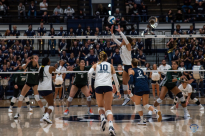Shultz on Football: Replay puts passion for Gaelic game on display
DUBLIN – Sunday’s All-Ireland semifinal was my first taste of Gaelic football, aside from a brief YouTube clip, and everything about it was perfect.
The first half was later described to me as sort of slow. But the scene captivated me from the time my Penn State journalism class, which arrived in Dublin on Saturday morning, saw the end of an under-18s match held before the main event.
As the minutes ticked away, I started to see from my seat in the Cusack Stand – the lower tier, Section 310, Row JJ – what thousands of Irish see every week in Gaelic football. The sport features the physicality of American football, the non-stop flow of soccer and scoring low enough that each point still means a good deal, but high enough to give fans plenty to cheer about.
And there was enough passion for everyone. From the group of Mayo fans behind me who groaned about the officiating to the Kerry supporter a few rows ahead who sprang from his seat when the green and yellow notched the final point, it was obvious how much this game mattered to everyone.
Everything made sense, regardless of nationality. Until the end of the match, that is. The score was tied, 19-19 to an American, or 1-16 to 1-16 in Irish.
Used to a winner
Americans are used to a winner and loser, even if that means overtime or a contest that’s less than the game – think penalty kicks in soccer.
And yes, there can be draws in U.S. sports, but never during postseason play. That was the difference last Sunday, as the tie at the end of regulation warranted a replay of the game this weekend.
For us, it was a puzzling sight. As the final whistle sounded, everyone around us grabbed their belongings, while my class just stood there, baffled and disappointed in the outcome.
As it turns out, that seems to be exactly how many Irish fans are feeling this week now that Saturday’s replay of the semifinal is being moved from the historic grounds at Croke Park to Limerick because of the long-since scheduled game between Penn State and Central Florida.
And as I learned about the fan reaction in Ireland, it became evident to me that this week of American college football in Dublin represents an intersection of two cultures deeply invested in sports. The only problem is they’re not on the same page.
The college football matchup means a great deal to Central Florida, which gave up a home game for this. The Knights are coming off a one-loss season in 2013 and have a coach of Irish heritage, George O’Leary.
It might mean even more to Penn State, a school that has won two national championships.
In the aftermath of the Jerry Sandusky child sex abuse case in 2012, Penn State received a four-year postseason bowl ban. Without a bowl waiting at the end of the year, Penn State has only big regular-season contests to look forward to, no matter its record, even though its players have no connection to the Sandusky case.
Formidable team
The Croke Park Classic provides a bowl game atmosphere: The Nittany Lions will play another formidable team in a neutral, amazing location. For some fans, this is their first trip overseas.
Even if it appears to be an outrage that college football is kicking Kerry and Mayo out of Croke Park, Saturday’s game should showcase an atmosphere that’s a lot like what I saw last weekend.
Penn State football is a staple of life in Pennsylvania, and in many places in the United States, American football has the same importance as Gaelic football does in Ireland – when the game starts, that’s what matters.
Dubliners don’t need to embrace the Croke Park Classic like any other game played at the stadium, and Americans shouldn’t be expected to feel guilty for the quasi-sin that is being committed this weekend. But it’ll be easier to understand this controversy if each side realizes that the passion behind each game is the same. There will be two meaningful contests on Saturday, but just one Croke Park.
It’s a shame that the stars aligned this way because all parties deserve to play at the venue. Perhaps we could all use a replay on this one.
(Eric Shultz is a student in the John Curley Center for Sports Journalism at Penn State.)








